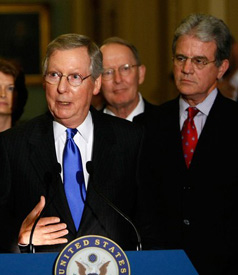
|  |  |  Editorials | August 2009 Editorials | August 2009  
Sotomayor Vote; Republicans a Party Out of Touch
 Bill Hare - Political Cortex Bill Hare - Political Cortex
go to original
August 07, 2009


| | Mitch McConnell (R- Kentucky), shown with other Republican senators, has fought the nomination of Sonya Sotomayor for the Supreme Court. (Getty Images) |  |
A once strong Republican Party that Karl Rove and Grover Norquist predicted would eviscerate its opposition has resorted to such a bungling spectacle that Rush Limbaugh has been declared in many circles as its de facto leader.

A classic current example is the 68-31 confirmation vote Thursday for Obama Supreme Court nominee Sonia Sotomayor. Not one Democrat voted against the woman who will become the first Hispanic ever to wear a Supreme Court robe. All no votes were cast by Republicans.

As a party the GOP broke 31 against Sotomayor with 9 votes supporting her. Senator John Voinovich of Ohio, a shrewd politician who served as mayor of Cleveland before reaching the Senate, stated realistically that, while Sotomayor would not have been his nominee had he been president, that this was not his role. It was up to him to decide if she were qualified to serve as a Supreme Court justice and voted yes accordingly.

Minority Leader Mitch McConnell of Kentucky's analysis of why he would vote against Sotomayor that he could not be confident that she would put political and personal considerations behind her when casting votes, and as such he was voting against her, is arrant nonsense both on a pragmatic political as well as philosophical level.

Did Senator McConnell frame the issue accordingly when Republican chief executives proposed nominees? Do judges fall within impenetrable vacuums?

It has been a long time maxim in Washington that "Justices follow election returns." Can McConnell name one judge in Supreme Court annals who was able to function within the kind of philosophical straitjacket he saw fit to impose on Sonia Sotomayor?

This was one of the points that Republicans nitpicked in Sotomayor's confirmation hearings, taking a statement she made that essentially stated that we are all a byproduct of our own personal experiences, and that our thought cannot help but reflect this truism.

As a woman from an Hispanic, working class New York City background, she would reflect certain insights and experiences drawn from them that someone of another background could not, at least to an appreciable degree.

The same circumstances relate to any other judge. As such it is good to seek some semblance of balance on any court. A court, like any other body, reflects the sum total of the backgrounds of the individuals who comprise it and the experiences from which they draw from those uniquely personal experiences.

The other point on which Republicans chose to take issue with Sotomayor was a case involving an allegation of reverse discrimination in hiring practices.

Anyone who ever attended law school realizes that these are the cases that draw much comment in class discussion and law review articles. They are difficult to decide and will leave many unhappy with whatever result is reached, but spark much interest in those interested in legal theory.

Such cases frequently boil down to interpreting arcane phraseology that, even by the most careful arbiter, is open to varied interpretation. A judge operating from a roughly centrist position on the ideological pendulum might move in one direction, that of affirmative action, in one case and differently in another.

Based on her record, Sotomayor looms as a centrist and embodies the best that Republicans could anticipate from a Democratic president with majorities in both houses of Congress.

Before the hearings ended the National Rifle Association and anti-abortion lobby weighed in, with Republicans paying deference to two groups that have long held strong party influence.

The Republican Party's unpopularity with the broad mainstream of U.S. voters stems from the fact that it is increasingly perceived as a body perpetually beholden to right wing pressure groups.

It is ludicrous that a radio demagogue like Rush Limbaugh, whose popularity stems from pleasing a radical right fringe, would be perceived by so many Republicans as a de facto party leader, if not the de facto party leader.

Disagree with the Reagan Revolution as one might, the Republicans who successfully forged it knew enough to deliver a clear and concise message to voters. The effort was to make Ronald Reagan, a California politician spawned from right wing zealotry, palatable to the vital center that decides American elections.

The strategy was to concentrate on two basic themes of taxes and diminished regulation. This strategy was delivered within an overarching message of returning America to past greatness and pride in being an American.

While many questioned the principles and objectives of Reagan and the revolution for which he stood, the difference between those Republicans and the blundering figures of the party's current existence was the ability to package outwardly appearing clear, palatable ideas that resonated with the central core of U.S. voters. |

 |
|  |



